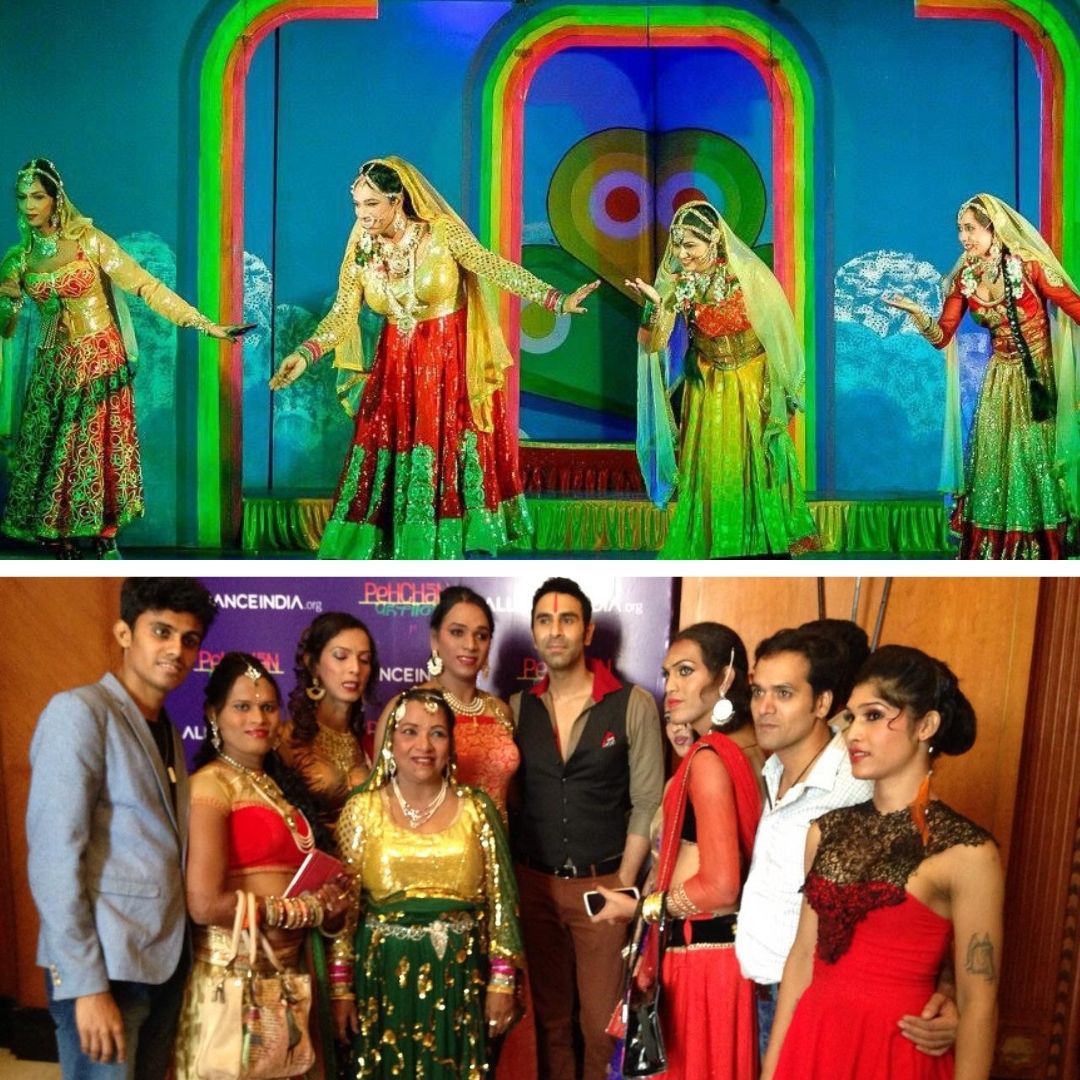
Image Credits: From The Source, From The Source
Fighting All Odds! 'Dancing Queens' Battle Stigma To Become India's First Transgender Dance Troupe
Maharashtra, 27 Jan 2022 5:55 AM GMT
Editor : Snehadri Sarkar |
While he is a massive sports fanatic, his interest also lies in mainstream news and nitpicking trending and less talked about everyday issues.
Creatives : Akanksha Saxena
I am a budding journalist who loves to write stories that have the ability to connect with people.
Founded in 2009, the group uses dance as a medium of self-expression and raise awareness about the LGBTQIA+ community in India, who continue to face discrimination on a daily basis.
The transgender community in India faces many hurdles in their daily lives. While measures have been implemented to help them in several ways, stigma and discrimination continue to be the order of the day. The sheer lack of sensitization is evident in how the community is treated daily. They are denied fundamental rights and facilities because of their identity, negatively affecting them.
However, they continue to soldier on. In various fields, community members have excelled with flying colours by making a mark in society earning accolades. Their hard work and determination is seen as an inspiration to the country and gives hope to the marginalized groups that anything is possible.
From politics to art and entertainment, the transgender community stuns the world. A shining example of this is a group that uses dance as a medium for self-expression and raises awareness about LGBTQIA+ rights.
'Culmination Of Dance & Rhythm'
'Dancing Queens' was founded in 2009 and launched in 2013. This group is the brainchild of a transgender activist named Abhina Aher, who sowed the seeds with Urmi Jadhav and Madhuri Sarode Sharma.
The name itself is a proud representation of the transgender dance group, the first-ever in India. "Very often, the gay and transgender people are called 'queens' in a derogatory way. We, as a group, decided to own the name. Let's use the term 'queens' as somebody who rules everyone's hearts through her dancing," Abhina Aher explains to The Logical Indian.
For Aher, her life is moulded around dance and rhythm. She was assigned the male gender at birth, with her name being Abhijeet. Her parents were popular artists themselves, where her mother is a renowned Kathak, Kuchipudi and Bharatanatyam dancer and her father was a Dholki player.
She adds, "My birth is the culmination of dance and rhythm. My birth name was given Abhijeet, which is an actor's name in a movie called 'Jal Bin Machli Nritya Bin Bijli', in which his character is passionate about music, art and dance." Aher was highly fond of dancing from a very young age. She exclaims, "I would wear my mother's saree, her ghungroos and applied make-up and danced in front of the mirror.
The dancing bug bit her when she was just three years old when her feet automatically moved with the rhythm when there was music nearby. Furthermore, her mother mesmerized her when she stormed the stage with her dance prowess.
'Boys Don't Dance'
When she was six years old, Abhina Aher started to identify herself as someone 'different'. Slowly and steadily, dance became an integral part of her life, as it was the source of her happiness and a reason to exist.
At 11 years old, fate had other plans when puberty hit Aher like a truck. She gathered the courage to confess to her mother her passion for dancing but was left heartbroken. "She (mother) was disgusted, and she said boys don't dance and she will never teach me how to dance," she recalls in the conversation.
However, Aher kept dancing to her heart's content until her mother saw her in action at their local neighbourhood one day. Enraged beyond belief, she hit her and blamed herself for the consequences. Further, she made her promise to never dance again in the future. Nonetheless, she learnt how to dance while quietly observing her mother and performing alone. All of this was done in utmost secrecy.
At 19, Abhina Aher did her first performance at a cultural programme. The event is still fresh in her mind as she chats with The Logical Indian, "When my mother saw me dancing at the programme, she walked out! She could not gather the courage to be a part of it. When I came home, she asked me, who taught you to dance? I said 'you'! You taught me dancing, but you don't know that you did."
Dancing Their Hurdles Away
The road ahead was not easy for Abhina Aher. Many people subjected her to sexual harassment and rape and considered her effeminate. Not only that, she had to put dancing in the backburner and took up a job in the tech space to make ends meet. She faced a lot of discrimination in this field, which impacted her mental health adversely.
Only when she was acquainted with 'The Humsafar Trust' made her realize her true passion. "It just opened up my mind to new prospects. I go, and to know more about sexuality and gender," Aher adds. Soon, she organized dance therapy for many others who belonged to the transgender community. Most of them used to beg on the streets and were battling grave issues such as substance abuse, suicidal thoughts, etc.
A show was organized every Friday within the Trust, where the community members got an opportunity to showcase their talents. It presented an excellent opportunity to Aher as she saw the potential in several of them. She says, "What I realized was they have immense talent! However, it was showcased during events such as weddings, etc., but it was not in a good light."
'Dancing Queens' - A Safe And Respectful Space
The budding talent in the community motivated Abhina Aher to start a dance workshop. She invited trans women who begged on the streets or were subjected to torture and ostracised by their family members. Very soon, Aher decided to make a dance group with all the participants.
This gave rise to who 'Dancing Queens' are today. Their first performance was during a fundraiser event for The Humsafar Trust. With jitters and excitement alike, the troupe danced their hearts out as they wanted to raise money for the occasion with it. Their performance was a massive hit as everyone lauded it. "That night, we raised Rs 65,000! Almost 13 transgender people performed on Bollywood numbers and did some Classical dances. More than 150 people attended it."
The positive response inspired her to take this initiative further. Slowly and steadily, 'Dancing Queens' became a safe space for the community. Aher explains, "While these people were dancing on the stage, they were gathering a huge amount of respect as an artist. Second, when they rehearsed together, they organically became a family. All of them showered love and support for each other. Third, it kept them busy. I was working on the self-aspirational value as it prevented them from resorting to smoking, drinking or harming themselves."
A Delightful Learning Curve
Since then, there has been no going back. 'Dancing Queens' have performed in professional theatres and have received adulation. Over time, the troupe also evolved and learned several things. Their dance genres expanded from classical forms to Bollywood and others. The company stuck to a theme and performed on it. It also includes Cabaret, Ballet as well.
"At times, some of our shows flopped as well. When we found out the reason, we realized that we were only dancing to numbers that we liked. While we liked classical dance a lot, that is not entirely entertaining. Therefore, we decided to change a few things and research what kind of dances clicked with the audience," Aher points out, adding that the group also spoke to choreographers who advised them on their dance moves and techniques.
It was this fearless attitude that made 'Dancing Queens' successful. Till now, they have performed in theatres and corporate events as well. The dance troupe got the opportunity to participate in the Kashish Film Festival, an annual event for the LGBTQIA+ community held in Mumbai.
Apart from self-expression, the dance performance raises awareness about the community. "In our show, the last 15 minutes are used for something called a 'Transgender Play'. It is a dance drama where we showcase the journey of a young transgender person, from the time she is rejected by her loved ones to society accepting her for who she is. We also do an interactive session where we talk to the audience, and they ask questions about gender and sexuality to the performers," Abhina Aher explains.
Fighting All Odds
While 'Dancing Queens' has tasted success, it has come at the cost of prevailing stigma and rampant discrimination the transgender community still faces in India. The troupe often did not receive payment after their performances. "I spent my entire provident fund on the group. The payment is meager when we are performing, more so because we are transgenders. You do a show for three hours but for that itself; you are rehearsing for months. I have spent over 15-20 lakh rupees from my pocket to provide for my performers," Aher adds.
Not only that, there have been instances where the troupe has been invited to perform but are eventually cheated as they do not get their promised payment. The stigma is the added problem where those who even perform with the troupe are mistreated.
It is a proven fact that their path has not been easy. However, 'Dancing Queens' continues to win people's hearts all around the country. Becoming India's first transgender-led dance troupe has only strengthened Aher's resolve to do better each day. With their talent, they want to make a difference in society by encouraging people to accept the transgender community. Apart from establishing themselves as a professional dancing troupe, they want to open a dance school, specifically for transgender people.
Also Read: Who Is Gay Soldier J Suresh And Why Defence Ministry Objected To Make Film On His Life?
 All section
All section














